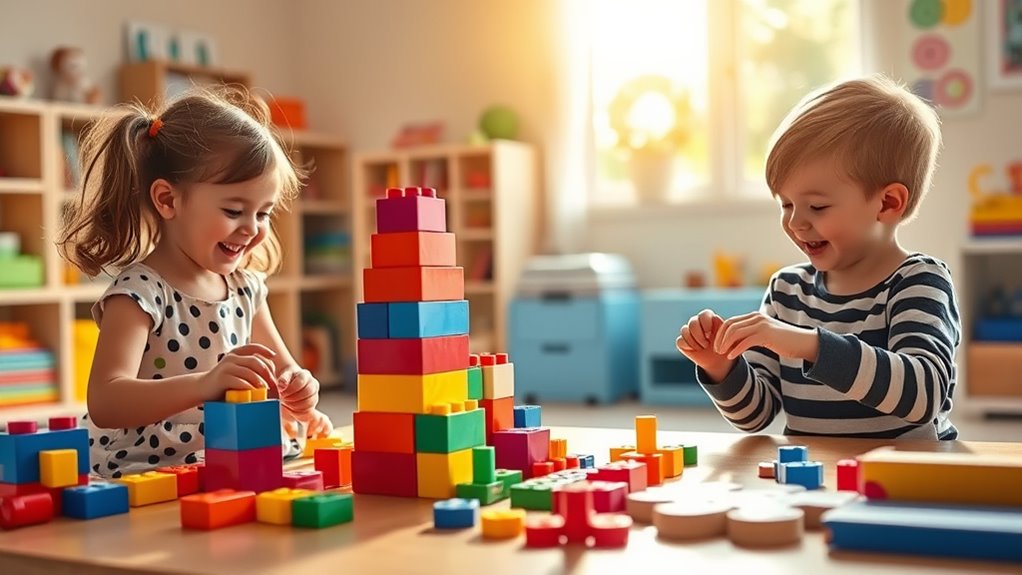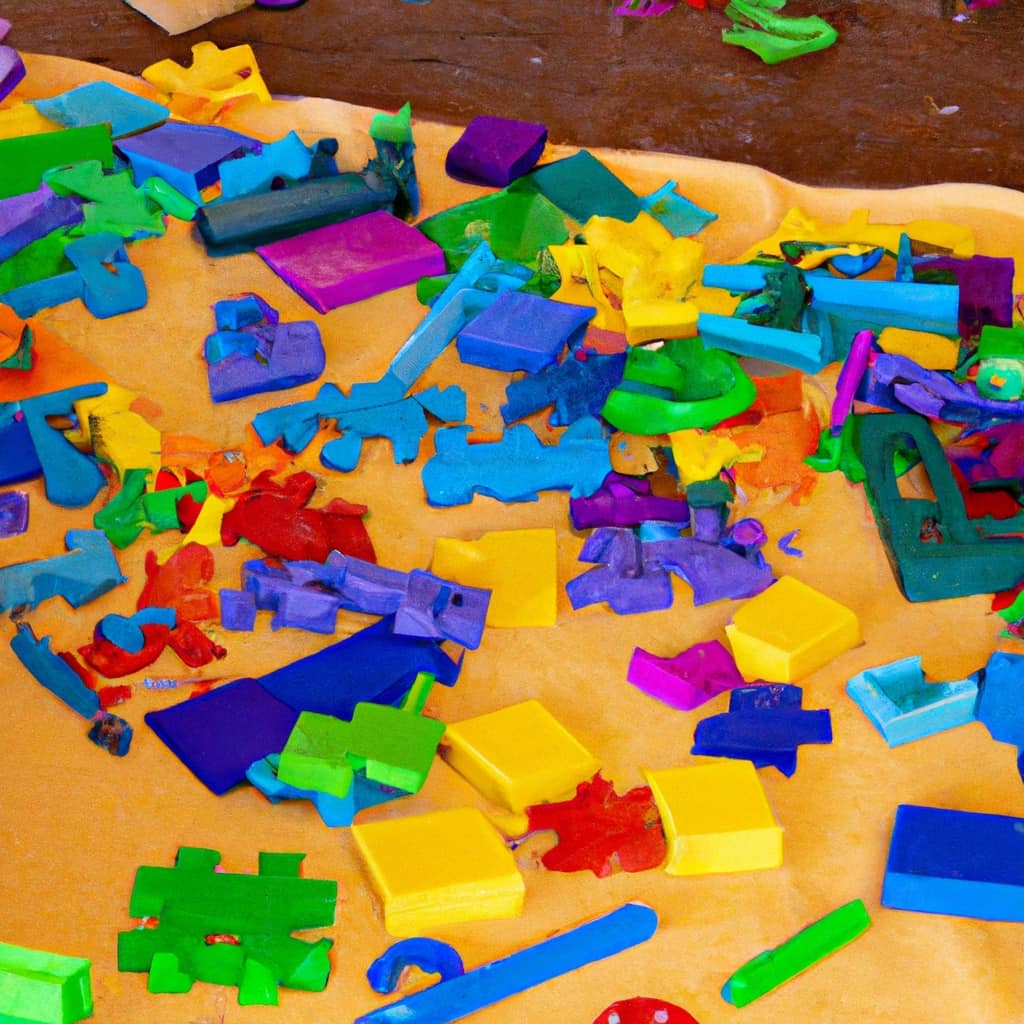Engaging in play boosts your brain’s ability to learn, solve problems, and handle emotions. It strengthens neural pathways essential for thinking, creativity, and self-control. Play activities like puzzles, pretend scenarios, and strategy games challenge your memory and flexibility while reinforcing impulse regulation. As you participate actively, you build a strong cognitive foundation that supports future success. Keep exploring, and you’ll discover even more ways play enhances your brain’s power and resilience.
Key Takeaways
- Play stimulates neural pathways involved in learning, problem-solving, and emotional regulation, enhancing overall brain development.
- Engaging in strategy and rule-based games strengthens working memory, impulse control, and cognitive flexibility.
- Play fosters creativity and exploration, rewiring brain connections for innovative thinking and adaptability.
- Through pretend and constructive play, children develop higher-order thinking and problem-solving skills.
- Active play builds neural pathways that support emotional resilience, learning, and executive functioning for future success.

Play is more than just fun; it’s a powerful tool that boosts your brain’s development and function. When you engage in play, especially activities that challenge your mind, you’re actively strengthening neural pathways that are essential for learning, problem-solving, and emotional regulation. One way play enhances your brain is through play therapy, which is often used to help children process emotions and develop cognitive skills. During play therapy, you’re encouraged to explore different scenarios, express feelings, and experiment with solutions—all of which foster critical thinking and emotional resilience. These activities don’t just help with emotional growth; they also support the development of executive functioning skills, which are *indispensable* for managing tasks, controlling impulses, and planning ahead.
Play enhances brain development, emotional resilience, and executive skills vital for daily success and problem-solving.
Executive functioning includes skills like working memory, cognitive flexibility, and inhibitory control. Play naturally promotes these abilities by requiring you to think on your feet, adapt to changing rules, and remember different strategies. For example, when you play a game that involves strategy or rules, you’re exercising your working memory by keeping track of multiple elements at once. You also learn to switch strategies or perspectives, which enhances cognitive flexibility. Impulse control is exercised when you learn to wait your turn or follow rules, strengthening your ability to regulate your behavior in real-life situations. These skills are *indispensable* for academic success, social interactions, and everyday decision-making.
Through play, you’re also honing your problem-solving skills. Whether you’re building with blocks, engaging in pretend play, or solving puzzles, you’re learning how to analyze situations, consider options, and implement solutions. This kind of mental exercise rewires your brain, making it more efficient at handling complex tasks in the future. *Moreover*, play encourages creativity and innovation, which are linked to higher-order thinking skills. When you’re allowed to explore ideas freely, your brain makes unique connections that improve your overall cognitive flexibility and adaptability.
In essence, play isn’t just a break from routine; it’s a *fundamental* component of cognitive development. It nurtures your executive functioning, helping you become more organized, adaptable, and capable of managing the demands of daily life. Whether through structured play therapy or spontaneous activities, play actively contributes to building your brain’s power. So, the next time you’re playing, remember that you’re not only having fun—you’re also strengthening the very foundation of your cognitive abilities.
Frequently Asked Questions
How Does Play Influence Emotional Regulation in Children?
When you let children play, you’re helping them develop emotional resilience and better behavioral regulation. Through play, they learn to manage their feelings, cope with frustration, and bounce back from setbacks. As they navigate social interactions and solve problems, they build confidence and emotional strength. Play provides a safe space for children to express emotions, practice self-control, and develop the skills needed to handle life’s emotional challenges effectively.
Are There Specific Types of Play More Effective for Brain Development?
They say, “Variety is the spice of life,” and this applies to play too. You’ll find that structured puzzles sharpen problem-solving skills, while outdoor exploration boosts creativity and curiosity. Both types of play are effective for brain development, helping children build connections and develop critical thinking. By mixing these activities, you give your child a well-rounded boost, nurturing their mind in different ways and fostering lifelong learning.
How Does Play Impact Language Acquisition in Early Childhood?
Play profoundly impacts your child’s language development by encouraging active communication and social interaction. As they engage in pretend or cooperative play, they practice vocabulary expansion and improve their understanding of language structure. You’ll notice your child experimenting with new words, asking questions, and using language more confidently. Play creates a fun, supportive environment that nurtures their ability to express ideas, develop vocabulary, and build essential communication skills for early childhood growth.
Can Play Improve Social Skills Alongside Cognitive Development?
Playing helps you improve social skills by encouraging team building and fostering cultural awareness. When you engage in group activities, you learn to communicate effectively, share, and cooperate. Play also exposes you to diverse perspectives, boosting your understanding of different cultures. These experiences strengthen your ability to work with others and navigate social situations confidently, making play a crucial tool for both cognitive growth and social development.
What Role Does Unstructured Play Have in Creative Thinking?
Did you know that children engaging in unstructured play show a 30% increase in creativity? During unstructured play, you encourage imagination enhancement and problem-solving skills, fostering innovative thinking. This free-form activity lets you explore ideas without constraints, boosting your ability to think outside the box. By allowing yourself time for unstructured play, you nurture your creative thinking and develop skills essential for tackling complex challenges confidently.
Conclusion
Think of play as a workout for your brain—each game or activity is like lifting weights for your mind. Just like a child who builds a tower from blocks, you’re strengthening neural connections with every playful moment. Research shows that kids who play regularly develop better problem-solving skills and creativity. So, embrace play as your brain’s secret gym, and watch your mental muscles grow stronger, sharper, and more resilient with every joyful moment.










